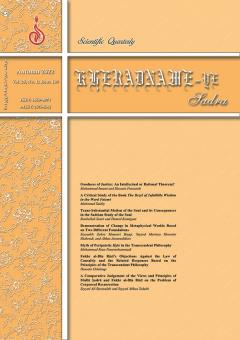Trans-Substantial Motion of the Soul and its Consequences in the Sadrian Study of the Soul
Subject Areas : ملاصدراپژوهی و اندیشۀ حکمت متعالیه
Rouhollah Souri
1
![]() ,
Hamed Komijani
2
*
,
Hamed Komijani
2
*
![]()
1 - Assistant Professor, Philosophy Department, Kharazmi University, Tehran, Iran
2 - PhD Candidate of Islamic Philosophy, Baqir al-Olum University, Qom, Iran
Keywords: trans-substantial motion of the soul, origination of the soul, gradedness, essential experience, natural death, Ideal body, purgatorial perfection, falsity of incarnation, station of annihilation, Mullā Ṣadrā,
Abstract :
The soul goes through elemental, natural, mineral, vegetative, animal (Ideal immateriality), and rational (intellectual immateriality) stages in the cradle of its fluid existence. Therefore, the soul’s belonging to the body is a part of its identity and, thus, it can be said that the soul is a material-immaterial substance. Given the existential fluidity of the soul, Mullā Ṣadrā has reinterpreted its various characteristics. Accordingly, the soul’s faculties are levels of its continuous truth that flourish one after each other. Moreover, natural death is the result of the soul’s ontological gradedness and losing interest in elemental body. At some stages of this ontological becoming, the soul attains immateriality and, hence, its survival after death become necessary. Because gradedness and, as a result, attaining immateriality are essential to the soul, its incarnation and return to elemental body is unjustifiable. Therefore, after death, the soul begins its purgatorial life in an Ideal body that is created based on its moral habits, and the natural form that is created in the matter of elemental body opens the path towards purgatorial perfection before it. One of the most important consequences of the soul’s trans-substantial motion is its entrance into divine worlds and annihilation in active, attributive, and essential oneness. Interestingly enough, based on the trans-substantial motion, this significant achievement is possible at the moment of the soul’s belonging to elemental body and is not necessarily limited to the moment of occurrence of natural death.
قرآن كريم.
ابنسينا (1363) الالهيات من الشفاء، تهران: ناصرخسرو.
امينينژاد، علي (1394) آشنايي با مجموعه عرفان اسلامي، قم: مؤسسة آموزشي و پژوهشي امام خميني.
جامي، عبدالرحمن (1370) نقد النصوص في شرح نقش الفصوص، مقدمة ويليام چيتيك، تهران: مؤسسة مطالعات و تحقيقات فرهنگي.
حسنزاده آملي، حسن (1381) الحجج البالغة علي تجرد النفس الناطقة، قم: بوستان كتاب.
حسنزاده آملي، حسن (1393) سرح العيون في شرح العيون، قم: بوستان كتاب.
طوسي، نصيرالدين محمد (1383) شرح الاشارات و التنبيهات، قم: بوستان كتاب.
فناري، محمد بن حمزه (1370) مصباح الانس، تصحيح محمد خواجوي، تهران: مولي.
قونوي، صدرالدين محمد (1381) ا؛عجاز البيان في تفسير ام القرآن، تصحيح سيدجلالالدين آشتياني، قم: بوستان كتاب.
قيصري، داود (1375) شرح فصوص الحكم، تحقيق سيدجلالالدين آشتياني، تهران: علمي و فرهنگي.
قيصري، داود (بيتا) شرح فصوص الحكم، چاپ سنگي.
ملاصدرا (1381) الحكمةالمتعالية في الاسفار الاربعة، ج5، تصحيح و تحقيق رضا محمدزاده، تهران: بنياد حكمت اسلامي صدرا.
ملاصدرا (1382) الحكمةالمتعالية في الاسفار الاربعة، ج9، تصحيح و تحقيق رضا اكبريان، تهران: بنياد حكمت اسلامي صدرا.
ملاصدرا (1383) الحكمةالمتعالية في الاسفار الاربعة، ج8، تصحيح و تحقيق علياكبر رشاد، تهران: بنياد حكمت اسلامي صدرا.

